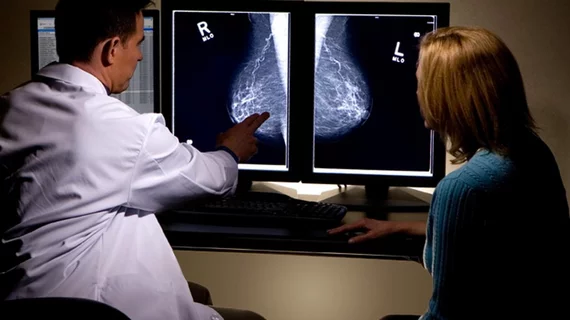Can radiologists who interpret mammograms make the switch to DBT?
Radiologists who interpret traditional two-dimensional (2D) mammograms required little time in transitioning to reading digital breast tomosynthesis (DBT) exams, or three-dimensional (3D) mammograms, and improved their accuracy in detecting cancer, according to research published online Feb. 26 in Radiology.
The study, led by Diana Miglioretti, PhD, dean’s professor of biostatistics at the University of California Davis Department of Public Health Services, found these radiologists also recalled patients for additional testing at a lower rate on DBT than 2D mammography regardless of whether patients did or did not have dense breasts.
“We found that patients with or without dense breasts benefit from lower recall rates with 3D mammography and there is no trade off with cancer detection,” Miglioretti said in a prepared statement. “In fact, we were surprised to find that improvements in recall rates were larger in women without dense breasts.”
Included in the study were 106,126 DBT and 22,248 digital mammography exams performed in more than 270,000 women from 2010 to 2017. The exams were interpreted by 104 radiologists spanning 53 facilities across five U.S. states. The data was collected by the Breast Cancer Surveillance Consortium.
Specifically, the researchers sought whether radiologists experience a learning curve for 3D mammography interpretive performance.
Overall, Miglioretti and colleagues found that both breast imaging subspecialists and general radiologists improved their screening performance with lower recall rates and similar cancer detection rates when they switched from 2D to 3D mammography.
The screening mammography recall rate decreased from 10.4 percent prior to DBT adoption to 9.4 percent after DBT adoption, without a decrease in cancer detection rate (4.6 per 1000 screenings for DBT compared to 4.0 per 1000 screenings for digital mammography).
Additionally, improvements in recall rate were greater in women with non-dense breasts as compared with women with dense breasts, according to the researchers.
From their findings, Miglioretti and colleagues noted that women who want to reduce their chances of being recalled for additional testing should request a DBT at their next mammography screening.

